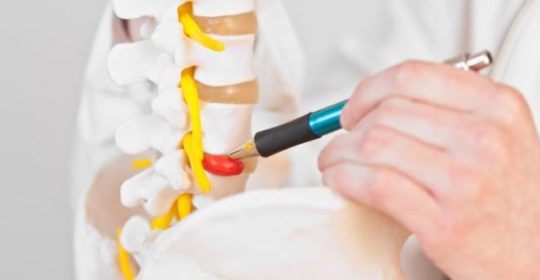
Slipped Disc: Symptoms, Causes & Effects
The bones (vertebrae) that make up the spinal column are stacked on top of each other and are cushioned by small discs. These small, round discs surround the nucleus and protect the bones by absorbing shocks from regular, daily activities such as walking, lifting, or twisting. Slipped discs can be identified by physical or neurological exams by our licensed neurologists in Dubai.
Each disc present in the spinal cord has two parts to them – a tough outer ring, and a soft, gelatinous inner portion. Injury, aging or weakness to the spinal cord can cause the inner part of the disc to protrude through the outer ring, causing a herniated disc, or slipped disc. This can cause pain and discomfort, and if the damage is severe and the slipped disc compresses a spinal nerve, you may experience numbness, weakness and/or pain along the affected nerve. Surgery may be required in more severe cases to repair or remove the slipped/herniated disc.
What Causes a Slipped Disc?
Slipped discs can be caused by a strain or an injury. Even though the disc material does degenerate naturally as people age while the ligaments weaken, even a small strain or twist can cause discs to rupture.
Some people may be more susceptible to slipped discs and can suffer from displacement in several places along the spinal column.
Symptoms
While most slipped discs can occur in the lower back region, it is known to also occur in the neck. Due to this, the signs and symptoms will usually depend on where the injury has occurred and whether or not the disc is pressing on a nerve.
A common symptom would be a feeling of pain in the arm or leg if the herniated disc is in the lower back. If the injury has taken place in your neck, you will most likely feel pain in the shoulder or arm. This pain may also shoot down your arm or leg when you move, cough or sneeze.
Those injured with a slipped disc will often feel sensations of numbness or tingling in the part of the body that has been affected by the damaged nerves.
Slipped discs can also cause weakness. The muscles strained due to the affected nerves will weaken over time, causing those injured to lose balance and prevent them from lifting or holding items like they usually would.
In some cases, people may not even realize they have a slipped disc if they do not show any symptoms. They would only be aware of the injury if it shows up on a spinal image.
Diagnosing and Treating Slipped Discs
In order to diagnose a slipped disc, doctors will perform a physical exam in order to gauge the back for signs of tenderness. Doctors may also perform neurological exams to test reflexes, the ability to walk, muscle strength and whether or not you will be able to feel light touches or vibrations.
Typically, medical history and a physical exam are adequate when it comes to identifying slipped discs.
Treatments for slipped discs can range from conservative to surgical and will depend on the level of discomfort and how far the disc has slipped out of place.
Physical therapy is also a reliable option for treating slipped discs.
Conservative Treatment (Medications)
- If pain is mild to moderate, doctors will recommend over-the-counter pain medication such as acetaminophen, ibuprofen or naproxen sodium.
- When pain from a slipped disc does not improve with oral pain medication, doctors may recommend a cortisone injection that would be administered into the area around the spinal nerves. This would be done with the help of spinal imaging.
- Muscle relaxers may also be prescribed if muscle spasms occur. However, these do come with side effects such as dizziness.
- Specialized Physiotherapy is essential to treat and also to strengthen and prevent a relapse or additional slipped disc.
Surgery
In rare cases, doctors may suggest undergoing surgery if conservative treatments fail to provide any relief after six weeks. If you continue to experience pain, numbness, weakness, loss of bladder or bowel control, or difficulty standing or walking, doctors will recommend surgery to remove the herniated part of the spinal disc.
Complications
If slipped discs are left untreated, it can lead to permanent nerve damage. In some cases, untreated slipped discs can cut off the nerve impulses to cauda equina nerves in the lower back and legs, rendering a loss of bowel or bladder control.
Saddle anesthesia is also a complication that can arise from untreated slipped discs. The slipped disc will compress the nerves, causing a loss of sensation in the inner thighs, back of the legs and around the rectum.
Prevention
To help prevent a herniated disc, it is highly recommended that you:
- Exercise daily to strengthen your muscles and support the spine.
- Maintain good posture to reduce the pressure placed on your spine and discs. Keeping your back straight and aligned will help you maintain good posture especially when sitting down for long periods of time.
- When lifting heavy objects, use your legs, not your back.
Maintain a healthy weight as excess weight can put more pressure on the spine, making you more susceptible to herniated discs.

